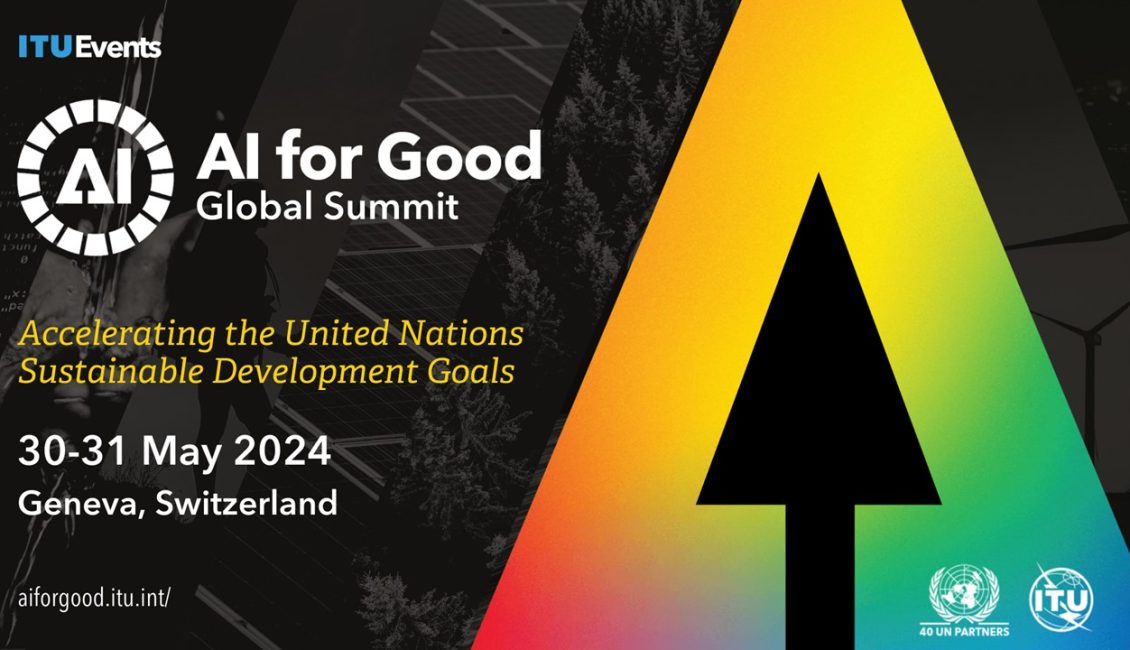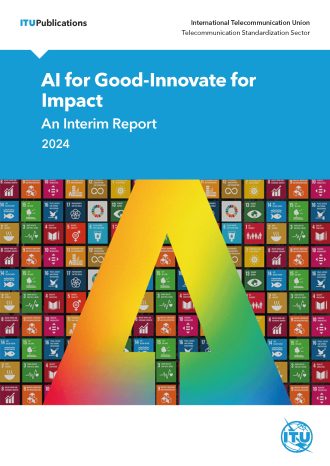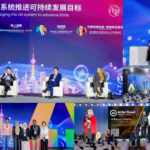
Join us on a journey!
Harness the power of Artificial Intelligence (AI) for the betterment humanity and the preservation of our planet. Supported by the Ministry of Industry and Information Technology (MIIT) of China, AI for Good extends a global invitation to innovate and propel AI solutions forward, aimed at achieving the the United Nations Sustainable Development Goals (SDGs).
There are two independent ways to be part of our journey: Submit use cases and/or apply for a scholarship as described below to contribute to a global repository of AI-driven solutions for sustainable development.

Submit your innovative AI use cases
Submit your innovative AI use cases to potentially feature them at the AI for Good Global Summit. In addition, selected use cases would receive mentorship and be awarded prizes in July 2024.

Apply now to become an AI for Good Scholar
Respond to our call for AI for Good Scholars. Aimed at nurturing aspiring talent dedicated to leveraging AI for the attainment of the SDGs, AI for Good Scholars would work closely with ITU to develop, analyse and refine AI use cases.
Participation
Both calls are free of charge and open to individuals and organizations coming from a country that is a member of ITU.
We encourage submissions from a broad spectrum of participants, which include, but are not limited to:

Academia and Research Entities

Startups

Industry

Policymakers and Government Bodies

NGOs and Civil Organizations

Individual Innovators

Academia and Research Entities

Startups

Industry

Policymakers and Government Bodies

NGOs and Civil Organizations

Individual Innovators
Gender balance and regional balance will be considered.
NOTE: The call for AI use cases and the call for AI for Good Scholars are separate initiatives. Submitters of use cases can also apply for the scholarship; it is voluntary and at the discretion of the submitter. Submitting use cases does not automatically qualify one for the scholarship, nor does it provide any advantage in the scholarship application process.
Innovative AI use cases Timeline
1 March 2024 – 31 March 2024
April 2024 – May 2024
May 2024
July 2024
Submission period
Evaluation process
Use cases published and workshop
Report and awards
Innovative AI use cases Timeline
1 March 2024 – 31 March 2024
Submission period
April 2024 – May 2024
Evaluation process
May 2024
Use cases published and workshop
July 2024
Report and awards
Innovative AI use cases Submission Categories
The submission categories include AI applications in areas impacting the various SDGs. Examples of such areas are:

Healthcare: AI applications in diagnostics, personalized medicine, patient care, and medical imaging analysis.

Finance: AI usage in fraud detection, risk assessment, algorithmic trading, and customer service.

Manufacturing: AI-driven predictive maintenance, process optimization, supply chain management, and robotics.

Automotive: AI in autonomous vehicles, predictive maintenance, safety features, and navigation systems.

Future networks: AI applications in future networks including IMT-2020 (5G) and IMT-2030 (6G).

Other Industries: AI applications in sectors beyond the above categories (e.g., agriculture, education, energy).
Innovative AI use cases Evaluation Criteria
Participants whose use cases closely align with the objectives of AI for Good and score well on the evaluation criteria below, will be notified.
10%
Clarity and completeness: are all the questions completely answered? Is all the information to evaluate the use case available from the response?
10%
Is the link to the SDGs correctly justified?
30%
Would AI in this use case accelerate the achievement of SDGs?
20%
Is future work clearly outlined and is the proposal aligned with ITU’s scope?
30%
Is the sequence diagram clear? Does it map to ITU Standards and have the potential to evolve into ITU Standards?
Win AI for Good prizes by submitting use cases
More information coming soon
AI for Good Scholars Timeline
1 March 2024 – 31 March 2024
March 2024
April 2024 – May 2024
30–31 May 2024
Submission period
Notification of selected scholars
Work with ITU to analyse use cases submitted (Journey 1)
AI for Good Summit
AI for Good Scholars Timeline
1 March 2024 – 31 March 2024
Submission period
March 2024
Notification of selected scholars
April 2024 – May 2024
Work with ITU to analyse use cases submitted (Journey 1)
30–31 May 2024
AI for Good Summit
AI for Good Scholars Detailed Application Guidelines
Academic Qualifications:
- Applicants can range from students to seasoned researchers or engineers. It is recommended that applicants come from STEM fields (science, technology, engineering, and mathematics).
- Applicants should have demonstrated excellence in academic performance, research, and – for students – relevant coursework.
Interests and dedication to SDGs:
- The applicant should have a strong awareness and interest in leveraging AI for the attainment of the UN SDGs.
- They should be able to articulate their interests and demonstrate how their studies, research or work aligns with specific SDGs.
- The applicant should have a dedicated commitment to addressing global challenges and contributing to the achievement of the SDGs through the application of AI.
Collaboration and Partnership:
- The applicant should indicate a project, ability and willingness to collaborate with different stakeholders, including researchers, organizations, and communities, around the world, to advance the use of AI for the SDGs.
Communication Skills:
- Effective communication skills , in one of the UN languages, both written and verbal, are important, as the AI for Good Scholars will be expected to convey their analysis and findings and collaborate with a diverse range of individuals and organizations.
Recommendation Letter:
- The letter of recommendation provided by a faculty, professional mentor, or advisor, should provide a comprehensive and compelling rationale for why the applicant is an excellent candidate for the AI for Good Scholars program.
Frequently Asked Questions
Submitting use cases to AI for Good can bring several benefits, such as:
- Visibility: Your use case can be featured and highlighted at the AI for Good Global Summit in Geneva. This provides an opportunity to showcase your work to a global audience of experts, policymakers, and stakeholders.
- Collaboration: By submitting your use cases, you can foster collaboration with AI for Good Scholars, ITU, and other organizations that are dedicated to leveraging AI for the SDGs. This collaboration can help further develop and analyse the use cases, leading to valuable insights and real-world impact.
- Contribution to SDGs: AI for Good aims to address the UN SDGs. By submitting use cases, you can actively contribute to achieving these goals and work towards creating a positive impact on society, the environment, and the economy.
- Prizes: if selected, your use case could win mentoring, prizes and resources. The prize categories will be announced in May.
An array of exciting incentives totalling up to USD 80K await you.
Submitting a usecase does not mean any commitment to launch or fund a project. If you are actively pursuing the usecase, it is possible that we could collaborate. However, it is not mandatory on your part to actively pursue the usecase in any form. For selected usecases, ITU may allocate some scholars to study them.
Selected AI usecases would be studied by AIforGood Scholars. Incentives allocated to selected usecases may include cloud credits, mentoring and prizes in July 2024. Total incentives amount to USD 80K. Individual prizes and categories would be announced in May during the AIforGood Summit 2024.
Usecases can be submitted as a team. However, if the team wins a prize, it may be divided among all contributors in the team. Scholar applications are individual by nature.
The usecases would be worked upon after submission till July 2024. Firstly, they would be evaluated based on the criteria mentioned above. Secondly, selected use cases would be assigned AIforGood Scholars to study and develop them. In this process, if the author of the use case would like to collaborate, they may contact us at the email ai-calls[at]itu.int
Applying for the AI for Good Scholar program can have various benefits, including:
- Recognition: The selected individual will have the opportunity to be recognized as a dedicated and talented scholar in the field of AI and sustainable development. This recognition can help enhance their professional reputation and open doors to further opportunities.
- Networking: AI for Good Scholars get the chance to work closely with ITU and other scholars who share a common interest in leveraging AI for the SDGs. This provides a valuable networking platform for collaboration, knowledge sharing, and future partnerships.
- Access to Resources: Scholars selected for the program may gain access to resources, such as research funding, mentorship, and training opportunities, which can strengthen their research capabilities and potential for impact.
- Attendance at AI for Good Summit: AI for Good Scholars would receive funding to to attend the prestigious AI for Good Global Summit in Geneva. This event brings together leading AI experts from around the world and offers valuable learning, networking, and exposure opportunities.
The evaluation process for use cases submitted to AI for Good may vary depending on the specific guidelines provided by the program organizers. However, typically, the evaluation criteria may include:
- Relevance to SDGs: Use cases will be evaluated based on how directly they address or contribute to the United Nations’ Sustainable Development Goals.
- Quality and Innovation: The originality, uniqueness, and innovative nature of the use case will be assessed, as well as the overall quality of the research and proposed solutions.
- Potential Impact: The potential impact of the use case on addressing societal, environmental, or economic challenges related to the SDGs will be considered.
- Feasibility and Scalability: The feasibility of implementing the use case, its scalability potential, and practicality in real-world settings will also be taken into account.
Ultimately, the evaluation process aims to identify use cases that have a high potential for making a meaningful contribution to the SDGs and can be successfully developed and analyzed within the AI for Good framework.
The originality, uniqueness, and innovative nature of the use case will be assessed, as well as the overall quality of the research and proposed solutions. In this case, we recommend to justify the uniqueness and innovation in your usecase. An already published usecase may not be a good choice. However, you could justify the innovative approach to solve the problems using AI, or you could provide other areas of uniqueness such as scalability of your usecase or relation with SDGs.
The evaluation process for applications to the AI for Good Scholar program will typically involve a comprehensive assessment of the applicant’s qualifications, research potential, and dedication to leveraging AI for the SDGs. The criteria for evaluation may include:
- Academic Qualifications: The applicant’s educational background, including their pursuit or possession of a related degree in a field of STEM (Science , Technology, Engineering and Mathematics ).
- Interests: The alignment of the applicant’s interests in SDGs and their relevance in addressing global challenges will be assessed.
- Collaboration and Leadership Potential: The applicant’s ability to collaborate with various stakeholders, engage in interdisciplinary work, and showcase collaboration will also be evaluated.
- Supporting Documents: The recommendation letter and CV provided will be considered in analysing the applicant’s suitability for the program.
The evaluation committee aims to select scholars who demonstrate strong potential for making contributions to the field of AI for the SDGs and who are likely to actively contribute to the AI for Good Global community and engage in valuable interdisciplinary collaboration.
Please refer to the “IPR matters” clause below.
Please address the recommendation letter to “ITU AIforGood”.
The scholar will be funded to travel to Geneva and attend the AIforGood Summit. There may be other resources allocated to scholars such as mentoring, trainings, access to ITU experts and cloud credits. These would be announced later.
The initiative is open to a range of applicants from students to seasoned researchers or engineers. This may include undergraduate students of STEM fields (science, technology, engineering, and mathematics) background, masters students or research scholars or postdocs. This may also include startups, industry professionals, policy makers / government bodies, NGOs/civil organizations, and other individual innovators.
If selected, AIforGood Scholars will study usecases and develop, analyse and refine them, including the application of AI in such usecases. This would be done remotely, from their home country, during April – May 2024 timeframe. Scholars selected for the program may gain access to resources, such as research funding, mentorship, and training opportunities, which can strengthen their research capabilities and potential for impact. In addition, the Scholars would would receive funding to to attend the prestigious AI for Good Global Summit in Geneva.
IPR Matters
By participating, you agree to grant ITU/MIIT non-exclusive, royalty-free rights to use your submission for any purpose related to the AI for Good project.
Submissions must not: (a). violate the intellectual property rights of third parties; (b) be illegal under applicable national laws and international law; and (c) depict or incite hatred, defame, abuse, harass, stalk, threaten a specific person or social group, incite violence or conflict or otherwise violate the legal rights of third parties (including those of privacy and publicity).
Participants will retain the intellectual property rights on the contents of their submissions. However, each participant grants ITU/MIIT a limited, non-exclusive, global royalty-free right and license to use, reproduce, communicate, demonstrate, make available for public display, and distribute the contents of their submission for ITU’s informational and educational or awareness purposes, via digital or other means, including ITU’s website. The participants hereby represent that they have the legal right to grant such license to ITU.
By entering the AI for Good use case submission and/or Scholar application, each participant agrees to release and hold ITU harmless from and against any and all claims, expenses, and liability, including but not limited to negligence and damages of any kind to persons and property, infringement of trademark, copyright or other intellectual property rights arising out of or relating to their participation in the AI for Good initiatives and the contents of their submissions.






